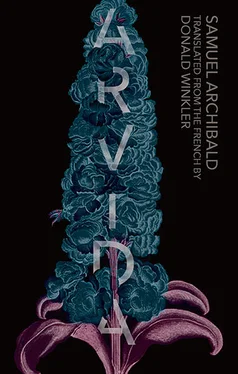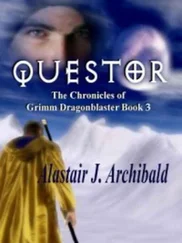Archibald Samuel - Arvida
Здесь есть возможность читать онлайн «Archibald Samuel - Arvida» весь текст электронной книги совершенно бесплатно (целиком полную версию без сокращений). В некоторых случаях можно слушать аудио, скачать через торрент в формате fb2 и присутствует краткое содержание. Год выпуска: 2015, Издательство: Biblioasis, Жанр: Современная проза, на английском языке. Описание произведения, (предисловие) а так же отзывы посетителей доступны на портале библиотеки ЛибКат.
- Название:Arvida
- Автор:
- Издательство:Biblioasis
- Жанр:
- Год:2015
- ISBN:нет данных
- Рейтинг книги:3 / 5. Голосов: 1
-
Избранное:Добавить в избранное
- Отзывы:
-
Ваша оценка:
- 60
- 1
- 2
- 3
- 4
- 5
Arvida: краткое содержание, описание и аннотация
Предлагаем к чтению аннотацию, описание, краткое содержание или предисловие (зависит от того, что написал сам автор книги «Arvida»). Если вы не нашли необходимую информацию о книге — напишите в комментариях, мы постараемся отыскать её.
, with its stories of innocent young girls and wild beasts, attempted murder and ritual mutilation, haunted houses and road trips heading nowhere, is unforgettable. Like a Proust-obsessed Cormac McCarthy, Samuel Archibald's portrait of his hometown, a model town design by American industrialist Arthur Vining Davis, does for Quebec's North what William Faulkner did for the South, and heralds an important new voice in world literature.
Samuel Archibald
Arvida — читать онлайн бесплатно полную книгу (весь текст) целиком
Ниже представлен текст книги, разбитый по страницам. Система сохранения места последней прочитанной страницы, позволяет с удобством читать онлайн бесплатно книгу «Arvida», без необходимости каждый раз заново искать на чём Вы остановились. Поставьте закладку, и сможете в любой момент перейти на страницу, на которой закончили чтение.
Интервал:
Закладка:
“Pa, aren’t you eating?” asked my brother.
And that’s when my father let it slip. He said:
“No, you eat. I’ll eat what’s left.”
Nadia, David and I looked at each other. Smiling. Nadia’s recipes were inspired for the most part by a time when people worked hard and families were big. She didn’t know how to cook light and she didn’t know how to cook for four. You could always find something in the kitchen, on the butcher’s block and the counters, enough to feed my father’s friends, my brother’s and my friends, the scroungers and strays who turned up at our house any old time, most often just before dinner.
We finally understood. In the midst of all this abundance, the lasagnas, the roasts, the boeuf bourguignons only a third consumed, my father for ten years had been acting out a great comedy of privation, with himself in the role of the father sacrificing for his own. A comedy of abnegation set in a regimental mess.
When I think about it now, the comedy darkens. The more I age, the more something tragic makes its presence felt, the sense of a bitter nostalgia at the core of all things: the idea of wanting to do something magnanimous for people who ask for nothing and are in need of nothing; the idea of a sacrifice reduced to a risible and secret simulacrum; the idea that the object of desire has nothing to do with desire itself; the idea that the fulfillment of the desire never satisfies it, nor does it make it disappear, and that in the midst of all the things longed for desire survives in us, dwindling into remorse and regret.
My father no longer lacks for anything, but he misses the taste food had when there was not enough of it.
It’s in pondering this that I understood that my father’s childhood tales have nothing to do with Proust. They’re even the polar opposite. In him, the deceptions, the gaffes, the misdemeanours and venial sins, the amorous thrills, the athletic exploits, everything, truly, in the end dwindles and melts away.
He told us how he saw people come out of their cars and throw up during a showing of Jaws at the Chicoutimi drive-in, and the story got side-tracked, lost itself in the odours of canteen grease and steamed hot-dogs.
He told us how Ghislaine, mother of the Devaux brothers, had been the first woman in Arvida to have breast implants inserted, early in the 1960s. After having seen a television report on the procedure, she had emptied her savings account and taken the only plane to Florida, saying to her husband Marcel:
“I’ve always liked that, big boobs.”
We wanted to know how people had reacted, seeing her lissome silhouette deformed by twin mortars, a spectacular affront to the laws of gravity and good taste that she still flaunts in the summertime, slung high in her sweaters, at almost eighty years of age. Before getting that far my father more often than not strayed into a digression concerning the same Madame Devaux, who served him his first spaghetti bolognaise, a dish whose taste and texture he’d found unspeakably gross.
He often talked about the time he’d almost died on his way home from the sports centre. After a game, his hockey bag over his shoulder, famished, he’d swallowed a Cherry Blossom whole, biting into the chocolate and sucking on the syrup, while overlooking the maraschino cherry, which blocked his windpipe. He’d tried to breathe as best he could, feeling his strength wane and his mind lose focus, before giving up the ghost and letting himself drop onto a snowbank. The hard snow’s impact expelled the cherry and sent it flying off into the grey sky before his clouded eyes. My father had lain there for a long time, numbed, before getting his breath back. We wanted to know what impact the incident had had on how he looked at life, but instead he chose to pronounce himself on Hershey Canada’s buyout of Lowney’s in 1952, and its inimical effect on the quality of a delicious chocolate that, to his mind, had become inedible.
If my father is a seasoned storyteller, food is his Achilles heel. For him, childhood does not spring full blown from a madeleine. On the contrary, all his childhood memories trail away into the evocation of a lost pastry and its indefinable flavour.
To truly understand what my father is talking about, you’d have to be able to savour a Sophie cake, a Saint-Joseph, or a big May West of yore, transforming a succession of vague metaphors into bodily stimuli. Phrases like “a chocolate that tasted equally of burnt coffee, cinnamon and crème fraiche ” or “whipped cream icing with a hint of hazelnut and orange peel” strive to say something, but only to our minds, not our taste buds. The words taste of nothing. They accumulate in a long list of lost desserts, sketching out in thin restless lines the likeness of a penurious childhood.
There is no memory in our experience of things. Long lost pastries bring back childhood for ourselves alone, and even then, if we take the time to chew them as carefully as we should, we have to admit that they no longer taste the same.
1 Laganière, an old friend of my brother, has cited my father as an example ever since he set his eyes, at the age of twenty-four, on a beauty from the Saguenay five years his junior. He likes to say to us (never in front of women, obviously), “Me, I saw Doug in action and I said to myself, ‘There’s a guy who’s figured it all out.’ Why weigh yourself down with an impossible woman and all her flaws when you can take one who’s really young and mould her to your tastes before she’s had time to develop a goddam nasty character?” My father always makes as if to accept the compliment, then he whispers in my ear, and that of my brother, “Poor imbecile. He doesn’t know what’s lying in wait for him.”
Antigonish
America’s a bad idea that’s come a long way. I’ve always thought that, but it doesn’t paint a very good picture.
I should have said: America’s a bad idea that has gone every which way. An idea that’s spawned endless roads leading nowhere, roads paved in asphalt or pounded into the earth or laid out with gravel and sand, and you can cruise them for hours to find pretty well zilch at the other end, a pile of wood, metal, bricks, and an old guy on his feet in the middle of the road, asking:
“Will you goddam well tell me what the hell you’re doing around here?”
America is full of lost roads and places that really don’t want anyone to get there. It took fools to make these roads and fools to live at the end of them, and there’s no end of fools, but me, I’m another kind of fool, one of those who tries to reinvent history, pushing on to the very last road, and the very last god-forsaken destination.
I’m sure they’ve made a much more welcoming road now, with scenic walks and lookouts and all that stuff, but in those days, driving the Cabot Trail at night in the middle of a storm was a crazy idea. The guy at the Cape North gas bar had been polite enough not to say anything. He’d only said, “Drive fifteen, twenty miles an hour, no more, and God willing, you’ll get to the other end.”
I had a Ford Galaxy 500, 1966, with a Thunderbird V8 engine, 428 cubic inches, under the hood. It guzzled gas big time, that’s for sure, and it gobbled up lots of asphalt, but that night it was rolling really slowly and nibbling away at increments of the road and the darkness and the fog that covered us and covered the trees, the cliffs, the Atlantic Ocean, and the whole world for all I knew.
Antigonish.
Menaud was sleeping beside me, so I couldn’t tell him that the word made me think of Antigone, the daughter of the king of Thebes, and above all of antagonist , which was especially appropriate given that I was battling the Cabot Trail, tacking hard with the steering wheel and the wheels themselves. I probably wouldn’t have let him in on that anyway. Menaud had the torso of a wrestler perched on bird feet, forearms like Popeye the sailor covered with long black hairs in zigzags, and between his incisors a hole big enough for you to poke in a finger. A thick beard lent a bluish cast to his neck and cheeks, and a single bushy eyebrow spawned a whole repertoire of grimaces where it overhung his evil eyes, hunched in their orbits like grackles in a stolen nest. He liked getting drunk, fighting in taverns, and telling stories he’d made up, and he’d never read a book in his life. We’d agreed, in ’65, on our strange way of travelling, making as many miles as possible in the time we had, but after that I don’t think we ever saw eye to eye on anything until in ’68 Johnny Cash brought out the disc he’d recorded in Folsom Prison.
Читать дальшеИнтервал:
Закладка:
Похожие книги на «Arvida»
Представляем Вашему вниманию похожие книги на «Arvida» списком для выбора. Мы отобрали схожую по названию и смыслу литературу в надежде предоставить читателям больше вариантов отыскать новые, интересные, ещё непрочитанные произведения.
Обсуждение, отзывы о книге «Arvida» и просто собственные мнения читателей. Оставьте ваши комментарии, напишите, что Вы думаете о произведении, его смысле или главных героях. Укажите что конкретно понравилось, а что нет, и почему Вы так считаете.












